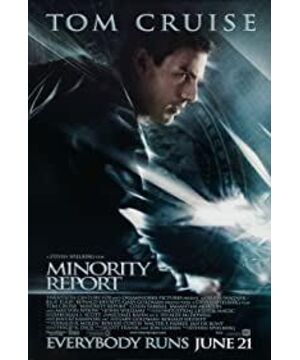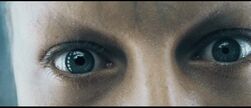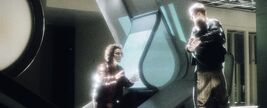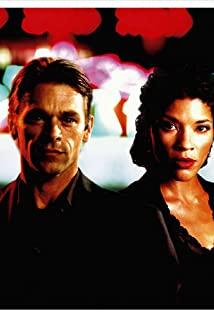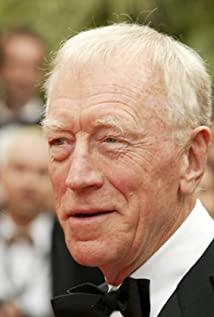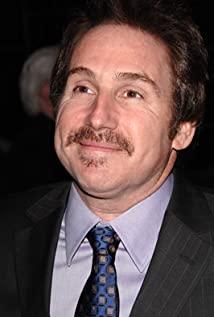From the dream combination of Tom Cruise and Gaspierberg, a big production such as "Minority Report" full of various commercial elements, it actually ended up in an embarrassing situation in the United States that year. At first glance, it is really impressive. An incomprehensible thing. However, with the narrative of the film, when we have to start using our not-so-complete thinking ability on the time axis, we have to admit that if a film attempts to become obsessed with technology and humanity within 120 categories Matching philosophical thinking, so many gimmicks will not make a commercial film easy to watch.
The film begins with the old tune of general sci-fi movies-to build a seemingly perfect future world, in which humans begin to use their seemingly mature predictive capabilities to stifle criminal behaviors before they are implemented. Such a world is tidy and efficient, and it seems to be flawless. Once again, mankind naively believes that the end of history has finally come, and we finally have a golden age of thinking about it.
The story is that the inventor of this crime prevention system began to work on promoting it throughout the United States-before the system was only used in Washington, DC. The matter is important, the FBI sent a young official to conduct a comprehensive assessment of the crime prevention system. The confrontation between tradition and advanced technology was at the very beginning.
The first climax of the film is a dialogue, and the background of this dialogue is that FBI officials forcibly break into the top-secret "temple" ("temple" is the "prophet" of the members of the crime prevention system, that is, the prediction The future judge, the nickname of the working environment. In the "temple", predictions about future crimes are generated). Representing traditional FBI officials who pay attention to logical reasoning and physical evidence, and the police captain representing the latest technology crime prevention system, one is deeply worried about human intervention in the future, and the other is about criminal behavior because of the cruel murder of his son. It is about prevention rather than waiting for the loss to happen and then doing nothing to save it.
The following is their conversation full of tension and the smell of gunpowder
FBI Officer: Technology is trustworthy, and this fascination ultimately leads to a false belief in technology.
Captain: We are just using the predictive power of technology to solve problems for us.
FBI Official: But people think that predictive power is divine power, and technology It's religion, just like you call the judges here "prophet" and "temples" here.
Captain of the police officer: "Temple" is just a nickname. Technology is. . .
FBI official: Perfect, right. I know you have to say that, and I admit it. But people are always flawed.
Here, FBI officials seem to be conservative, seemingly full of self-defensive resistance to the new technology. The captain of the police officer has devoted his sincere feelings to this system that seems to be able to solve the crime problem for humans once and for all, and he seems to be more moving and more correct.
The arrival of the film's true climax is full of drama. The new mission arrived, and the police captain was surprised to find that the culprit of this future crime was himself. What made him puzzled was that he had never met the victim who would be killed by him dozens of hours later. Facing the dilemma of being arrested by the system, as a last resort, the captain of the police officer hijacked a "prophet" to start a desperate journey. He hoped that the "prophet"'s understanding of the future would enable him to understand what will happen and avoid the final Occurrence of own crimes.
The superpower of the "prophet" did not disappoint the police officer captain. With the help of the "Prophet", the police officer captain avoided the chase from the system time and time again. This time and again, the evasion actually took the police officer captain to the place where the crime was predicted a few minutes before the predicted crime occurred.
The truth finally came to light. The victim to be killed by the police officer captain was actually the murderer who killed the police officer captain Aiko who had been at large for many years. As the "Prophet" predicted, the police captain raised his gun at the "victim" a few seconds before the estimated time of the crime. However, at the moment when the crime was expected to occur, the gunfire did not sound, "victim "What came in the ear was the declaration of the police captain regarding his legal rights: "You have the right to remain silent, but everything you say will be used as evidence in court. You have the right to hire a lawyer. If you do not have the ability to pay, we I will find one for you." As the "Prophet" said to the captain of the police officer: "I don't have your minority report here, but you still have the ability to make a choice."
However, whether the shot was shot at the end is actually of no importance to the thinking of the whole story. While the police captain was madly escaping for his life, inside the system, FBI officials used traditional logical reasoning tools to deconstruct the seemingly perfect technical system with precision like a scalpel.
FBI officials pointed out that possible problems often appear inside the system. If the future criminal offender predicted by the "prophet" is a member of our system, just like the police officer captain this time, is it possible that such a situation may arise: because he has all the details of the future crime, this system member as the future criminal uses In some way, to induce others to appear at the estimated crime location at the estimated crime time according to these details, and make the expected crime-oriented behavior, then this innocent person will undoubtedly be arrested by the system, and the system's alarm will be lifted. Of criminals will truly implement the crime that should have occurred without the risk of being arrested.
The question is raised, we have prevented the crime, but is the crime that we prevented really the crime we predicted? We have intervened in the future, but is the future we intervened in really the future we are trying to intervene in? Will the future turn of our intervention in the future not affect the expected effect of our intervention?
The "prophet" led the police captain to avoid the danger of being arrested, and these evasion led the police captain to the place where the crime occurred and the victims who might meet in the headquarters. Is the prediction of the "prophet" guiding us to better adapt to the future, or is the prediction of the "prophet" shaping the future?
When the captain of the police officer hijacked the "prophet" to evade the arrest of the system, the creator of the system said a thought-provoking sentence: "No one can stop him, because he is already part of the future." However, in the present, who is there? Isn't it part of the past and the future?
In the past, I saw this sentence in the film reviews of "Alien": "Alien" depicts a dilapidated and dirty high-tech future. This picture perfectly deconstructs technology, and technology is becoming more and more perfect. The cleanliness of technology will never obliterate the eternal incompleteness of human nature.” The clean and efficient future shaped by the "Minority Report" also portrays the flaws of human nature under perfect technology.
The film is committed to a non-linear thinking about time that goes against the traditional, and it inevitably brings a feeling of powerlessness to time thinking. Living under the irreversible arrow of time, we can surpass ourselves with the naked eye and think about the entangled future, and this future is actually interfered by the present.
After all, facing the chain of time, who can claim to always think clearly
View more about Minority Report reviews


